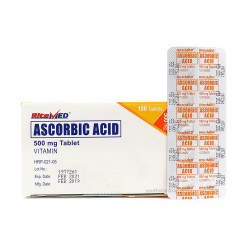Ascorbic Acid (vitamin C) Coupons and Discounts
Ascorbic Acid (vitamin C) is a drug belonging to the group of synthetic vitamins. One way to save money on the Ascorbic Acid (vitamin C) retail cost regardless of income and insurance status is to use Ascorbic Acid (vitamin C) coupons or discount cards from RXCoupons. Use our Ascorbic Acid (vitamin C) coupons at your online pharmacy and receive up to 75% off the sale price each time you refill your prescription.
What is Ascorbic Acid (vitamin C)
Ascorbic Acid (vitamin C) is a drug belonging to the group of synthetic vitamins. It regulates the synthesis of proteins and lipids and significantly increases the tone of the body. Vitamin C is necessary for strong bones.
Ascorbic Acid is often administered with glucose for the prevention of infectious diseases. This substance increases the body's resistance to infections.
Ascorbic Acid is recommended in case of hypovitaminosis of vitamin C (increased vitamin C requirements) associated with unbalanced diet, heavy mental activities, rehabilitation after serious diseases, alcoholism, smoking, prolonged fever, hyperthyroidism, chronic infections, diseases and surgical treatment of gastrointestinal tract (persistent diarrhea, peptic ulcer, gastrectomy), trauma, tuberculosis, pregnancy (especially associated with nicotine or drug dependence) and lactation, iron poisoning, idiopathic methemoglobinemia, prolonged stress, etc.
When to avoid Ascorbic Acid (vitamin C)
Ascorbic Acid (vitamin C) possible contraindications: hypersensitivity to ascorbic acid. Prolonged use (doses greater than 0.5 g) is contraindicated in the following diseases: diabetes mellitus, hyperoxaluria, thalassemia, hemochromatosis.
Ascorbic Acid should be taken with caution in any dosage (preferably under medical supervision) with diabetes, sideroblastic anemia, hyperoxaluria and kidney disease.
How to take Ascorbic Acid (vitamin C)
Ascorbic Acid (vitamin C) is taken in the following recommended doses:
For adults: 0.05-0.1 g 3-5 times a day. For children: 0.025 g 3 times a day up to 0.1 g 2-3 times a day.
Vitamin C deficiency during pregnancy and lactation: 0.3 g per day for about 2 weeks, followed by 0.1 g for the prevention of vitamin deficiency during the whole period of pregnancy and lactation.
Ascorbic Acid may be used intramuscularly or intravenously at a dose of 1 to 3 ml (5% solution). The course of treatment with drugs containing vitamin C depends on the nature of the disease.
Ascorbic Acid (vitamin C) side effects
Ascorbic Acid (vitamin C) can cause the following complications: Central nervous system: fatigue, dizziness, headache, irritability, insomnia (in long-term therapy). Urinary system: moderate pollakiuria (at a dose of 600 mg per day), nephrolithiasis, hyperoxaluria. Cardiovascular system: high blood pressure, hypercoagulation, microvascular complications (long-term use at high doses). Digestive system: irritation of the mucous membrane of the digestive tract (ingestion), tooth enamel damage. Immune system: allergic reactions (skin redness, skin rash). Other reactions: hyperglycemia, glucosuria, hyperestrogenemia, thrombocytosis, hypoprothrombinemia, hypokalemia, glycosuria, leukocytosis, erythropenia. Long-term use of high doses of Ascorbic Acid (more than 1 g): headache, insomnia, decreased capillary permeability, high blood pressure, hypercoagulation, hyperglycemia, glycosuria, hyperoxaluria, nephrolithiasis.
Ascorbic Acid (vitamin C) special instructions
Vitamin C stimulates the synthesis of corticosteroid hormones. Patients should regularly control blood pressure and monitor symptoms and signs of adrenal insufficiency.
Patients with an excess iron in the body should take Ascorbic Acid only in minimal doses.
Ascorbic Acid increases the concentration of salicylates, ethinyl estradiol, penicillin and tetracyclines. It improves the intestinal absorption of iron, reduces the effectiveness of heparin and indirect anticoagulants.
Quinoline derivatives, calcium chloride, salicylates, steroids should be used with extreme caution with Ascorbic Acid.
Primidone and barbiturates increase the excretion of the drug in the urine.
Ascorbic Acid reduces the therapeutic effects of neuroleptics (phenothiazine derivatives, amphetamine and tricyclic antidepressants).
Do not take vitamin C without a doctor's prescription, especially during pregnancy and lactation.

